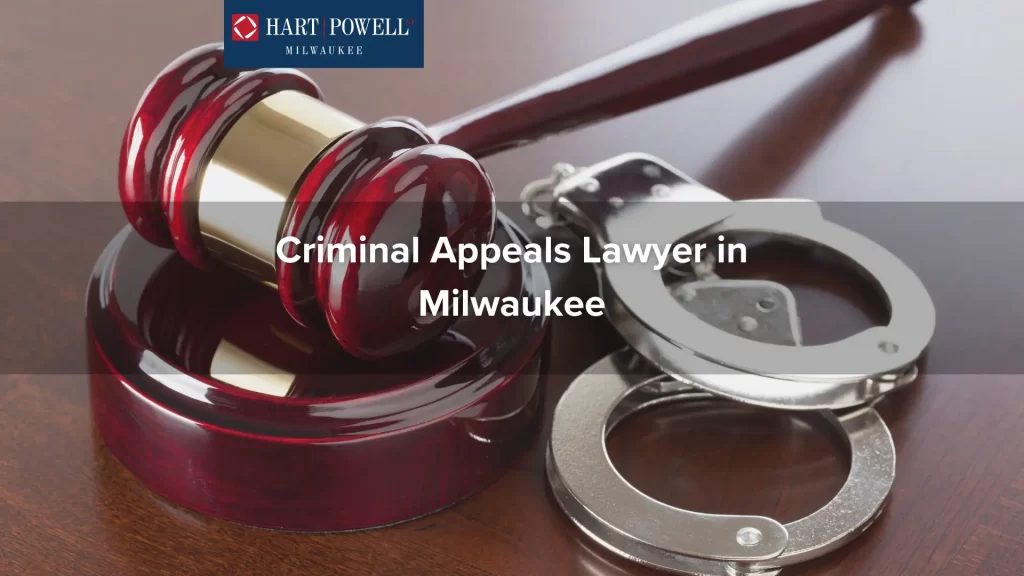
If you need help appealing a criminal conviction, contact Hart Powell, S.C. today. There could be many mistakes made during a trial. Although you’re facing criminal charges, you still have rights. If the judge or prosecution violated those rights in any way, we’ll argue against your sentence and try to overturn the conviction. We understand the legal process we must follow to reach a positive outcome. When you hire us, we’ll fight hard to secure your chance at freedom.
At Hart Powell, S.C., we have an experienced legal team that will work tirelessly to prove your innocence. We understand how overwhelming this situation can be. Facing penalties for a wrongful conviction can upend your entire life. We have the resources to file an appeal and create an effective plan to ensure this doesn’t ruin your future. Call us at (414) 271-9595 today to speak with a dedicated Milwaukee criminal appeals lawyer.
Federal Charges We Handle:
- Mail and wire fraud
- Drug trafficking and conspiracies
- Gun crimes
- Internet sex crimes
- Medicare and healthcare fraud
- Pre-indictment investigations
State Charges We Handle:
- Armed robbery
- Domestic violence offenses
- Drug crimes
- Marijuana possession
- Cocaine possession
- Heroin possession
- Methamphetamine possession
- DUI/OWI
- Fraud
- Homicide and murder charges
- Probation and parole revocations
- Theft/Burglary
- Sex crimes
What is an Appeal?
During an appeal, the convicted party within the circuit court system can seek a higher court’s judgment to overturn their conviction. Typically, appeals are filed because of an error during court proceedings. When you file an appeal, you don’t get to start a new trial. You won’t have the opportunity to submit new evidence or call new witnesses to testify. The appellate court will only review original documents and everything that happened in the circuit court. They will determine if there was an error and whether you’re entitled to a new judgment.
Common allegations defendants typically make during the appeals process include:
- The jury was presented with improper evidence
- The defense attorney made mistakes
- There were issues during jury selection
- Statements or evidence were illegally obtained
- The criminal statute used for a conviction was unconstitutional
- The sentence ordered by the judge was impermissible
Requirements for Filing an Appeal
In Wisconsin, there are various conditions that could make you eligible to appeal a conviction:
- The intention of the order or judgment was to be the final document during litigation: An order or judgment is final when the circuit court makes a decision as to one or more of the parties for all substantive issues.
- Appeal from a final judgment or order by the circuit court: An order or judgment is only final if it decides all issues or claims during litigation for one or more of the parties.
- Written order or judgment for the appellate court to review: A dismissed appeal will occur if there was an oral judgment or order.
- Filed order or judgment before the court has jurisdiction to review it: The entry date is the actual date filed with the clerk of court’s office. An appeal will get dismissed if filed before a judgment or order was entered.
- Petition for a non-final judgment or order to the court for an appeal: There must be a non-final judgment or order entered in writing. Within 14 days of the entered non-final judgment or order, there must be a petition filed with the court of appeals.
Steps During an Appeal in Wisconsin
File a Notice of Intent
Once sentenced, the circuit court must notify you of your rights to post-conviction relief. This relief can come in the form of an appeal or filing post-conviction motions.
If you intend to appeal the decision, you must file a notice of intent within twenty days of sentencing. This notice will protect your rights to fight against your guilty verdict and punishment. Since the deadline is short, you must make a decision quickly.
Choose a Form of Relief
The notice of intent only informs the court of your plans to move forward with an appeal. There are various motions you can file to seek post-conviction relief.
You can file a motion to withdraw a guilty plea. You must be able to show withdrawing your original plea is necessary to correct a manifest injustice. Examples of a manifest injustice include:
- You didn’t enter the plea voluntarily, knowingly, or intelligently because of a due process violation.
- There was a violation of your constitutional rights.
- New evidence was discovered that proves your innocence.
You also have the option of filing a motion to modify your sentence. Some legal grounds include:
- The court relied upon inaccurate information or considered an inappropriate factor, such as religion or race.
- The court’s reasoning for imposing your sentence wasn’t included on the record.
- The sentence is excessive for the specific crime.
- There’s new information that wasn’t made available to the court that could affect sentencing.
How you proceed will depend on the circumstances of your case. Your Milwaukee criminal appeals lawyer can help you determine the right option.
File an Official Notice of Appeal
You’ll file this document with the court, and the other party involved will receive a copy. After filing your official notice, you’ll need to prepare an appellant brief. This document should include the following information for the court to review:
- Specific facts about your case
- Grounds for review
- Arguments for your questions
In the appellant brief, you must describe specific errors you believe were made that allow you to appeal the court ruling. The appellate court can only decide based on the information you provide, so be as detailed as possible.
Review, Hearing, and Decision
It could take some time for the District Court of Appeals to make their decision after receiving the appellant brief. They’re under no time restrictions, so you’ll have to be patient. The average felony case can take up to two years, while a misdemeanor conviction could take less time to receive an appeal decision.
During the hearing, both sides will take the time to make an oral argument. It will be up to your Milwaukee criminal appeals lawyer to convince the court to rule in your favor.
After hearing both sides and reviewing the available documents, the court will choose to affirm, modify, or reverse the judgment made against you. They could also remand the case back to the circuit court for a new trial.
Why You Need to Hire a Milwaukee Criminal Appeals Lawyer
 Whether your conviction was for a misdemeanor or felony offense, you should contact Hart Powell, S.C. to represent you during the appeals process. It’s a complicated procedure that is challenging to navigate alone. Without legal representation, you could ruin your chance of reducing your sentence or getting the conviction overturned.
Whether your conviction was for a misdemeanor or felony offense, you should contact Hart Powell, S.C. to represent you during the appeals process. It’s a complicated procedure that is challenging to navigate alone. Without legal representation, you could ruin your chance of reducing your sentence or getting the conviction overturned.
When you hire us, we’ll use our experience, knowledge, and resources to thoroughly investigate your arrest, trial, evidence, and the prosecution’s case. We’ll look for mistakes that were made or a violation of your rights that can secure your freedom.
While we’re working on your appeal, we can request that the court stays your sentence and releases you on bond. We’ll file a motion that provides the court with sufficient information that there are issues with your conviction or sentencing, and that you’re not a flight risk. If the court approves our motion, you’ll remain out of jail while your appeal is pending.
Hart Powell, S.C. Will Fight Hard for Your Freedom
When you hire one of our Milwaukee criminal appeals lawyers, you’ll receive quality legal representation, advice, and guidance. We’ll be by your side to help you get through this devastating experience. You might feel like you don’t have any options after a criminal conviction. We’ll review your case and determine the best approach to overturn your conviction or argue for a reduced sentence.
You’re facing a long road ahead, and we’ll be by your side every step of the way. You won’t be in this fight alone. You can depend on our legal team to provide you with the one-on-one attention you deserve. We’ll always treat you like a priority and make ourselves available when you need us. Don’t leave the fate of your future in the hands of an overworked public defender. You should hire someone who will dedicate their time and attention to building a strong case that reaches your legal goals.
If you believe your rights were violated or there was an error during the legal process that led to an unfair conviction, call us at (414) 271-9595. We’ll schedule a consultation with one of our Milwaukee criminal appeals lawyers so you can discuss the details of your trial and find out what we can do for you. We’ll begin working on your appeal immediately and find a way to secure your freedom.
